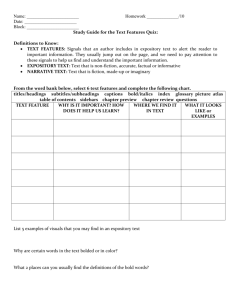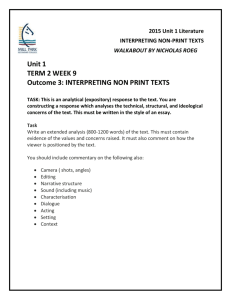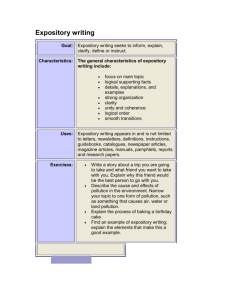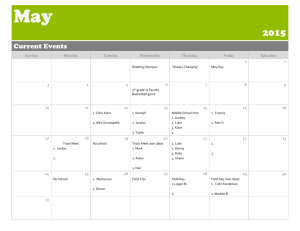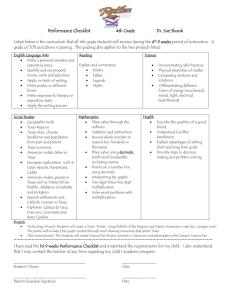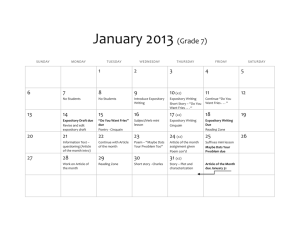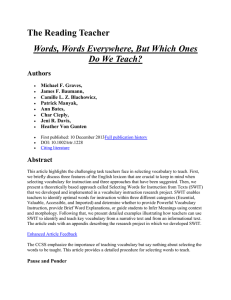What is a College Degree? Lesson Plan
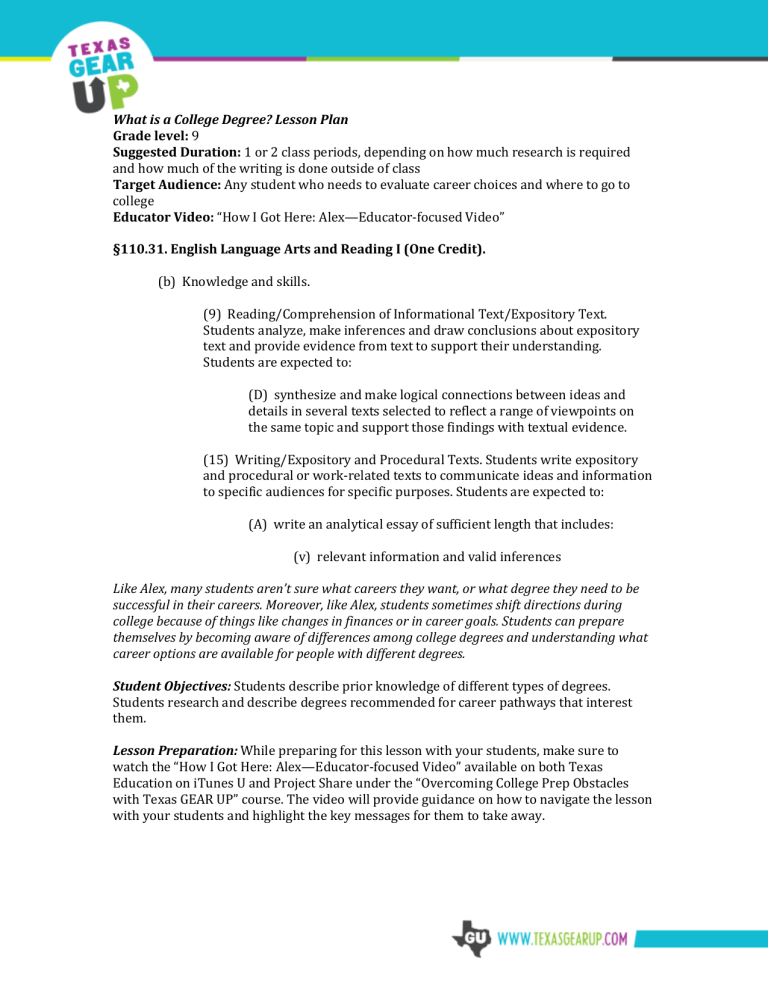
What is a College Degree? Lesson Plan
Grade level: 9
Suggested Duration: 1 or 2 class periods, depending on how much research is required and how much of the writing is done outside of class
Target Audience: Any student who needs to evaluate career choices and where to go to college
Educator Video: “How I Got Here: Alex—Educator-focused Video”
§110.31. English Language Arts and Reading I (One Credit).
(b) Knowledge and skills.
(9) Reading/Comprehension of Informational Text/Expository Text.
Students analyze, make inferences and draw conclusions about expository text and provide evidence from text to support their understanding.
Students are expected to:
(D) synthesize and make logical connections between ideas and details in several texts selected to reflect a range of viewpoints on the same topic and support those findings with textual evidence.
(15) Writing/Expository and Procedural Texts. Students write expository and procedural or work-related texts to communicate ideas and information to specific audiences for specific purposes. Students are expected to:
(A) write an analytical essay of sufficient length that includes:
(v) relevant information and valid inferences
Like Alex, many students aren’t sure what careers they want, or what degree they need to be successful in their careers. Moreover, like Alex, students sometimes shift directions during college because of things like changes in finances or in career goals. Students can prepare themselves by becoming aware of differences among college degrees and understanding what career options are available for people with different degrees.
Student Objectives: Students describe prior knowledge of different types of degrees.
Students research and describe degrees recommended for career pathways that interest them.
Lesson Preparation: While preparing for this lesson with your students, make sure to watch the “How I Got Here: Alex—Educator-focused Video” available on both Texas
Education on iTunes U and Project Share under the “Overcoming College Prep Obstacles with Texas GEAR UP” course. The video will provide guidance on how to navigate the lesson with your students and highlight the key messages for them to take away.
2
Teacher Direction: Introduce the lesson by distributing the Degree Types Handout. You may keep all the degree type descriptions on one page, or you may cut the paper so each type is described on one small strip of paper. Give students a few minutes to read and discuss. Ask students their level of familiarity with the various degrees described. Ask if they know of any examples of people who hold the various degrees. Provide examples if none are given by students.
Play the “How I Got Here: Alex—Student-focused Video” for your class or student. The video is available on both Texas Education on iTunes U and Project Share under the “Overcoming
College Prep Obstacles with Texas GEAR UP” course.
Tell students that if they have a solid interest in a particular career pathway, it’s time to do some research on the college programs that can help them reach their goals. U.S. News &
World Report frequently releases research on best schools for various professions. Here’s an example at http://grad-schools.usnews.rankingsandreviews.com/best-graduateschools/top-business-schools.
Possible Teacher Dialogue (directed to students):
On the web, see if you can find the top schools in your interest area. Then go to the schools’ websites and see what the degree requirements are for the level you would like to attain. If you aren’t sure how far you’d like to go in your chosen profession, start
with bachelor’s degree requirements.
Next, students have an opportunity to dive more deeply into their degree pathways. They will research, ask questions, pre-write and draft a brief essay. Ask students to include the following in their essays:
What your pathway is
What the best school you found is, and what types of evidence were cited (for example, qualifications of professors, student success after graduation, etc.)
What required courses you think sound the most challenging
What your highest degree will be
If students get stuck because they are unsure of the career they want, you may direct them to other resources.
Possible Teacher Dialogue (directed to students):
Still undecided on your career pathway? Before you attempt the above, go to www.texasgearup.com and follow the “no clue” path.
